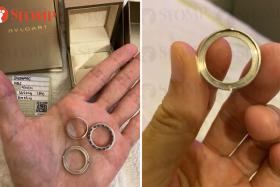Case: Consumers who pre-pay are taking a risk
Consumer watchdog concerned over two-fold jump in cases of pre-payments for goods and services last year
Pre-payments for goods and services are a growing concern, especially in an uncertain economy, says Singapore's consumer watchdog.
The Consumers Association of Singapore (Case) saw close to a two-fold jump in the number of consumers affected by company closures last year - with 877 cases - compared to 440 cases in 2015.
In 2014, there were 334 cases.
The bulk of last year's complaints were about California Fitness, which suddenly shut its outlets last July after nearly 20 years of operating in Singapore.
While the beauty and health industry is known for getting customers to sign packages at discounted prices, other businesses are also joining in this practice.
Case's new executive director, Mr Loy York Jiun, told The New Paper on Monday that it had recently seen cases of furniture companies and parallel importers who failed to deliver after collecting payments from customers.
Mr Loy, who started his new role at Case on Jan 1, added: "I would have liked some legislative protection for consumers, but right now we could do more in terms of consumer education.
"As consumers, the bargaining power is in your hands until you hand over the money. I don't think signing packages will go away, but consumers should be careful about signing expensive packages with attractive discounts as they are taking a risk."
In a separate interview, former Case head Seah Seng Choon, who is now the non-government organisation's adviser, also expressed concern over pre-payments and called it a "questionable" business practice that needs to be addressed.
He said: "As the number of companies collecting pre-payment increases, more consumers will be affected...
"More companies are jumping on the bandwagon because pre-payments from consumers are free cash or 'loans' to run their businesses."
In such situations, the consumers shoulder the risk and could lose their money if the companies go under.
Retail experts agreed that collecting upfront payments should not be used as a business model.
National University of Singapore Associate Professor of marketing Ang Swee Hoon thinks more should be done to increase awareness of accreditation schemes like CaseTrust, which recognises businesses that are committed to fair trading and transparency to consumers.
For instance, CaseTrust accredited companies in the spa and wellness industry allow customers a cooling-off period of at least five working days to seek a full refund.
Prof Ang added: "Consumers should be more cognisant as well and do their own screening. The future is unpredictable.
"After you pay the company, you have limited options if it closes down. It's a matter of penny wise, pound foolish."
Nanyang Business School Adjunct Associate Professor Lynda Wee said: "It should be done minimally as the core business of the company is not capital management.
"If they collect more than they can service, it is not ethical. There should be a limit to how much they can raise in this way."
But Prof Wee explained that pre-payments are also a form of customer retention.
"(The companies) cultivate loyalty through better deals. (It is also) a form of customer service as it offers convenience in payment."
MORE ON PAGE
Get The New Paper on your phone with the free TNP app. Download from the Apple App Store or Google Play Store now



